Oct 31, 2025 – Arrival in Bhutan, Moving to Trongsa
Hello. Today is the day Sunim arrived in Bhutan and planned to travel to Pantang, a remote village in the central mountainous region.
Sunim arrived at Bangkok Airport last night and waited for dawn, then departed from Bangkok Airport at 5 AM for Paro Airport in Bhutan.
The flight arrived above Paro Airport at 7 AM local time, but heavy rain and thick fog covered the area. As a result, the plane couldn’t land and had to circle above for quite some time.
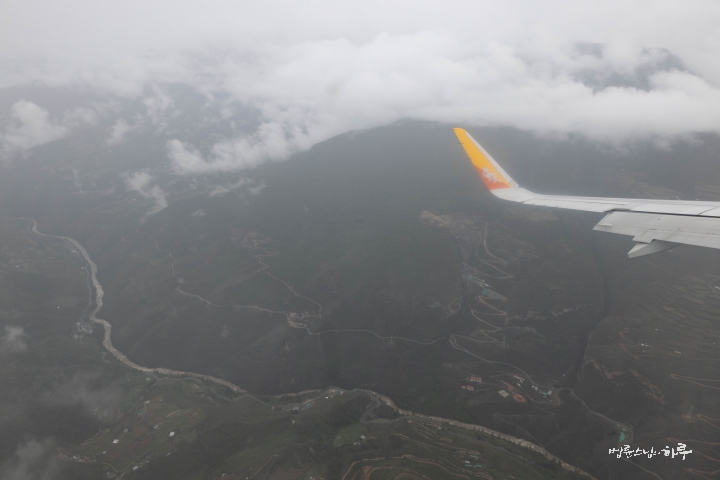
Eventually, unable to land, the plane diverted to Guwahati Airport in India for a temporary landing. After waiting there for 6 hours, the flight departed again for Paro Airport at 2:40 PM.
However, the weather remained poor, and once again the plane circled around the airport for a while, looking for an opportunity. After many twists and turns, the plane safely landed at Paro Airport at 3:40 PM. At the moment of landing, passengers applauded and cheered with relief.
After completing immigration procedures and collecting luggage, Yeshi from the Bhutanese central government warmly welcomed Sunim outside the airport. Sunim greeted Yeshi warmly, who had been waiting at the airport since morning.
“Thank you for waiting so long.”
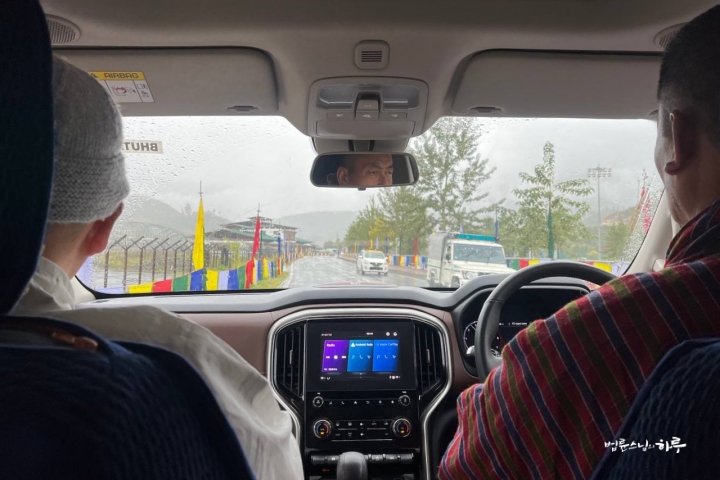
At 4 PM, Sunim left Paro Airport and departed for Trongsa in the central region. According to the original plan, they should have traveled to the Zhemgang region and reached Pantang, where the JTS Bhutan office is located. However, due to the flight delay, they decided to stay overnight at Trongsa, the midway point. Accordingly, tomorrow morning’s schedule was also hastily adjusted.
The road to Trongsa was an endless winding mountain path. As rain continued to fall, the vehicle crossed two passes over 3,000 meters above sea level. They stopped at a restaurant along the way for a simple dinner.
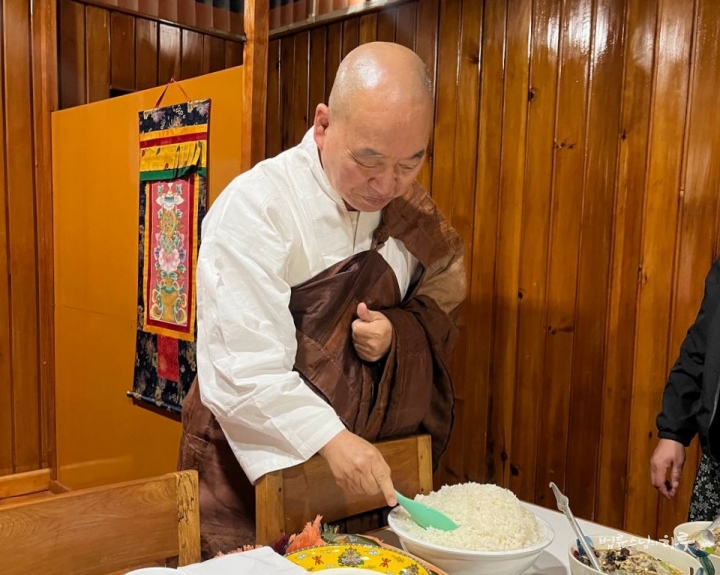
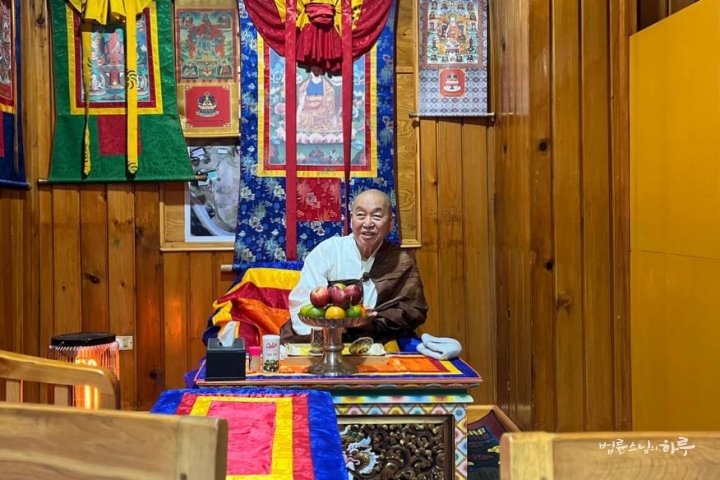
After finishing the meal, they got back in the car and continued traveling. While conversing with the companions, dusk fell and night deepened. After traveling for a full 6 hours from Paro, they arrived in Trongsa after 10 PM.
Tomorrow, Sunim will depart for Pantang at 5 AM, visit the Budashi Elementary School water supply repair site in the morning, and then hold a completion ceremony for the drinking water project. In the afternoon, there will be consecutive completion ceremonies for 4 newly built houses in Lamtang and Limapong, followed by conversations with the residents.
Since there was no Dharma talk today, I’ll conclude by sharing a conversation between Sunim and a questioner from the Dharma Q&A held on the 24th at the invitation of Seocho District Office.
Everyone Else Is Getting Ahead… Why Am I the Only One Living Slowly?
“I tend to be slow at whatever I do. I’ve always lived at my own pace. But now in my late 30s, when I look around, I feel like I’m riding a bicycle on a local road while everyone else is driving cars on the highway. When I get anxious and try to speed up to keep pace, I quickly burn out. How can I maintain my own pace without being swept up by those around me?”
“We have a Korean proverb that says, ‘A sparrow trying to follow a stork will split its legs.’ Proverbs contain wisdom accumulated from people’s experiences over many years. Not everyone can be a stork. Among birds, there are storks and there are sparrows. Just because a stork is fast doesn’t mean it’s better, and just because a sparrow is slow doesn’t mean it’s worse. The saying about splitting one’s legs trying to imitate a stork comes from this very situation.
You should go at your own pace. If living at your own pace causes some social disadvantages, then you need to accept them. In a society that values speed, those who are slower will inevitably suffer some losses. For example, in the era when people gathered wood in the mountains or dug the ground with pickaxes, wage differences based on physical strength differences between men and women were natural. We shouldn’t view this simply as a matter of gender equality. In a society where strength was the standard, men had an inevitable advantage. Similarly, in a society where speed is the standard, fast people have advantages while slow people are relatively disadvantaged.
But the world has changed now. We dig the ground with excavators instead of pickaxes. If you can operate an excavator, the physical strength difference between men and women becomes meaningless. In the past, in natural states or feudal societies where strength was the standard, male dominance was natural, but in modern society, knowledge and skills are important rather than strength. Especially in the digital age, delicacy and concentration are required. So in the future, women might actually have more advantages in social survival environments.
This is why movements like ‘Trumpism’ in America are emerging, trying to return to a male and white-centered society. Nostalgia and memories of past societies where strength was the standard have been revived. Just 50 years ago, the mainstream of American society was white males. But now the situation has completely changed. People of color and women are studying harder and achieving better results. In terms of creativity and ideas, women are showing much more prominence. The person who created the globally successful animation ‘K-Pop Demon Hunters’ is also a Korean woman. Despite experiencing discrimination as a woman of color, she created a superior work within white male-centered culture. This phenomenon can be seen as a signal that transcends racial and gender discrimination, beyond just individual success. In human history, no matter what civilization, resistance always emerges from the periphery of that civilization over time. Resistance to the existing order arises, and after that period passes, a new order takes hold.
Just look at schools now – female students have higher academic achievement. It’s the same in universities where women are more diligent and have better concentration. Male students are interested in drinking sessions and various other things, but female students have much higher concentration on their studies. That’s why resistance to these changes is appearing among men in their 20s these days. While gender equality has become natural, men feel they have no advantages. ‘I wasn’t given special treatment as a son at home, I competed equally with female students at school, so why do only men have to go to the military and why do only men have to do night duty?’ As these complaints accumulate, resistance naturally develops. As experiences of losing in competition add up, this resistance manifests as a social tendency.
I recently heard from an expert that looking at political tendencies by generation in our country, people in their 70s are the most conservative, followed by men in their 20s. Generally, younger people are more progressive, but now men in their 20s are actually more conservative than those in their 60s. Currently, people in their 40s and 50s are the most progressive, men in their early 20s to 30s have strong conservative tendencies, and those in their 60s are about half conservative and half progressive. These progressive and conservative tendencies affect society as a whole beyond simple political ideology.
You too should maintain your own pace, and if disadvantages arise from it, accept them to some degree. If disadvantages accumulate, you could criticize a society that evaluates based on speed. But you must acknowledge the fact that society currently evaluates by such standards. Within this system, being slow is somewhat disadvantageous – that’s unavoidable. You need to accept that much.
For example, if I go to America or Europe and am restricted from entering restaurants or universities because I’m a person of color, that’s clear racial discrimination and I should file a legal complaint. In such cases, you must correct it even if it means filing a lawsuit. However, if a white male is hired from among similar candidates for a white professor position, we can’t immediately conclude that’s discrimination. We too tend to feel affinity for people from the same hometown or same religion when conditions are similar. We can’t call all such cultural affinities discrimination. We need to accept some degree of it.
When I do charity work or social projects with JTS, most people I meet in civic solidarity activities are from Christian organizations. Everyone except me is Christian. So even though it’s not a religious gathering, they often start with prayer. But if I make an issue of that, it becomes difficult to work together. Instead, I respond actively. When we eat, I suggest first, ‘Pastor, would you please say grace?’ Then it becomes exchange rather than discrimination. Rather than complaining about our situation or conditions, I think we need an attitude of living wisely within them.
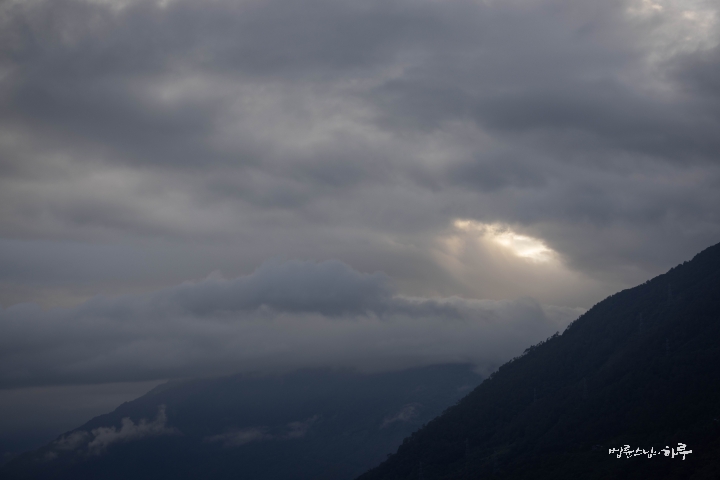
Similarly, you should maintain your own pace. However, if the disadvantages are too significant, it might be good to practice and gradually increase your speed. For example, if your speed is 10 km/h but the cutoff is 15 km/h, you could try practicing to meet that standard. That doesn’t mean you must match that speed. This isn’t about inferiority; it’s because society’s evaluation standards are set that way. During the Joseon Dynasty, the ability to write well and compose poetry was the standard for civil service exams, but now English, math, and science are the criteria. Evaluation standards change with each era. Just because you’re at a disadvantage with current standards doesn’t mean you’re inferior. However, since today’s society realistically values speed, it’s wise to either accept some disadvantages that come with it or adjust your speed just enough to avoid getting sick.
Among the people I work with, there are some who are exceptionally slow and others who are very fast. When such people work together, conflicts can easily arise. That’s why it’s necessary to understand the characteristics of those who are slower. You shouldn’t judge only by your own standards. Objectively, someone might be a bit slow, but they often don’t think of themselves as slow. That’s why it’s necessary to acknowledge the differences. On the other hand, while fast people could be said to have talent, they generally tend to be rather impatient. I’m speaking generally, of course.” (Laughter)
“Yes, I’ll take your words to heart and live well. Thank you.”





